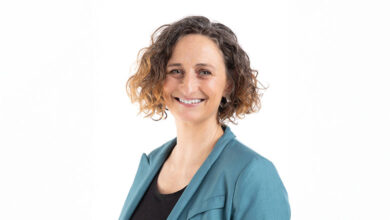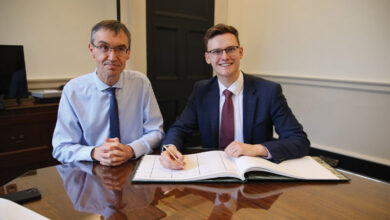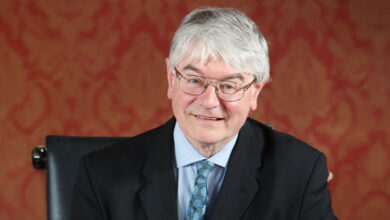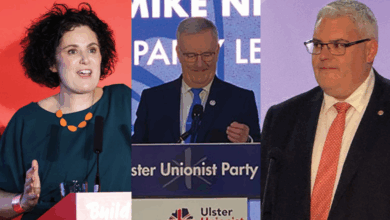In appreciation: Macdara Doyle
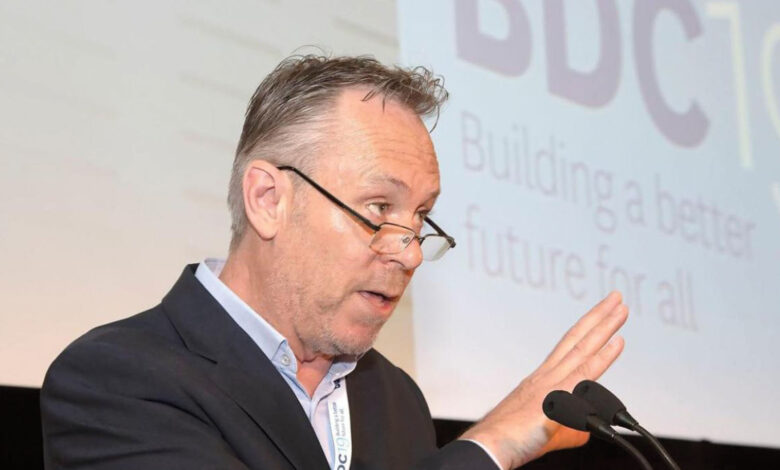
Macdara Doyle, who died on 24 August 2024 following a brief illness, was Campaigns Officer of the Irish Congress of Trade Unions (ICTU) and a frequent contributor to eolas Magazine.
Macdara’s death, at the age of 59, deprives his wife, Brónach, his daughter, Aoife, and his son, Ruairdhí, of a devoted husband and father.
With his mother Marie and sisters Ashling and Niamh, Macdara’s family led a wonderful tribute at Mount Jerome Cemetery, Dublin in a moving ceremony attended by the Aide-de-Camp to President Michael D Higgins, Sinn Féin leader Mary Lou McDonald TD, and Labour leader Ivana Bacik TD.
The eclectic attendance included friends and colleagues from the world of music, journalism, politics, and the trade union movement.
A lifelong NUJ member, Macdara did not lick his trade unionism from the cobblestones. His father, Larry, was a trade union official, and his mother, Marie, was a teacher from whom Macdara inherited a love of language and justice. From an early age he was campaigning on a range of social justice issues.
That lifelong passion was reflected in his activities as a member of UCD Students’ Union, his support for global solidarity campaigns and his abiding interest in Latin America.
UCD shaped Macdara. It was there he studied history and English, graduating with a master’s degree – and a future wife.
Brónach and Macdara had a shared interest in social justice, combined with a love of travel. They spent a year in Mexico, teaching English and translating texts. They saw at first hand the cruel impact of military rule on the indigenous people of Guatemala. And they got married in Cuba.
On returning to Ireland, Macdara broke into journalism, writing for An Phoblacht, In Dublin, Big Issue, Hot Press, Sunday Tribune, Fortnight, Magill, and eolas Magazine, always looking beyond the narrow confines of the Republic of Ireland and the politics of Tweedledum and Tweedledee, while also writing about another great passion, music.
Reading the Magill archive, you get a sense of the breath of Macdara’s interests – his media column cast a jaundiced eye on coverage of contemporary affairs but remain relevant.
The headline from his 1988 column repairs apposite: “Negative reporting, unfounded claims, and exaggerated headlines have dominated coverage of asylum seekers in Ireland.”
His laser eye focused on the global impact of Irish corporate giants such as Smurfit Cappa and Fyffes and on the devasting ecological impact of Monsanto. In a joint profile with Liz Walsh, he challenged the virtual canonisation of Peter Sutherland and never tired of railing against the naming of academic centres after imagined giant of Irish business.
Esther Lynch, General Secretary of the European Trade Union Confederation (ETUC), recalls working with Macdara in a campaign to end workfare in the early 1990s. “With his journalistic skills, he helped co-write a guide for unemployed people about their rights and, importantly how to organise to improve those rights,” she said.
For Macdara, his work in Ballymun with Esther was consistent with his work in Mexico: using his impressive literary skills to unlock the windows of knowledge.
It was Maurice Sheehan of Mandate who encouraged him to apply for a job with Concern. As communications officer, his writing skills were put to good use by David Begg and Sally Anne Kinahan.
His report from East Timor, After the Apocalypse, published in Magill in March 2001 showed the impact that visit had on Macdara. Those Concern field trips reinforced his commitment to social justice.
It was Sally Anne who encouraged him to apply for a job in Congress where David Begg recalls him giving a stunning interview.
As communications officer, he collaborated with the small team in Parnell Square, witnessing the highs and lows of social partnership, casting a cold eye on the arrival of the Celtic Tiger, the economic collapse, and the arrival of the Troika.
His writing skills, his intellectual rigour, and his genuine commitment to the labour movement were Macdara’s key attributes.
He could be impatient, stubborn, and irritated by the demands of the 24-hour news cycle. At times he could be incredibly laid back, even during an apparent crisis!
News-hungry journalists under pressure from a demanding editor would sometimes tear their hair out as an unflappable Macdara explained that there really was nothing to tell.
Macdara was a graduate of the Ronan Keating School of PR. Not being an instrument of policy or a prophet, he refused to predict the outcome of ongoing negotiations or complex disputes, adopting the mantra: ‘You say it best when you say nothing at all’.
He embraced new challenges as campaigns officer. The Raise the Roof campaign brought him back to his roots, while his passion for the environment found an outlet in his work on climate change and just transition.
I cherish the memory of a day spent in west County Offaly with Macdara and his friend and colleague David Joyce. My brother, Eamon, was our guide as we visited Lough Boora and gathered cranberries near Ferbane.
As we moved from town-to-town, Eamon explained the impact of Bord Na Móna’s withdrawal from the midlands on local communities. Macdara’s journalistic instincts kicked it, seizing on the need not just for a transition but a just transition for workers and their families.
All of us will have our own memories of Macdara. He wore his learning lightly. In unguarded moments he sometimes revealed the depth and expanse of his interests.
Behind his laid-back demeanour was a man of steel with solid principles and great integrity.
Séamus Dooley, Irish Secretary, National Union of Journalists (NUJ)
eolas Magazine regrets the death of veteran journalist and ICTU stalwart, Macdara Doyle, who was a regular contributor to this publication from its inception until his untimely death. His piercing insight will be missed.
Ar dheis Dé go raibh a anam.

